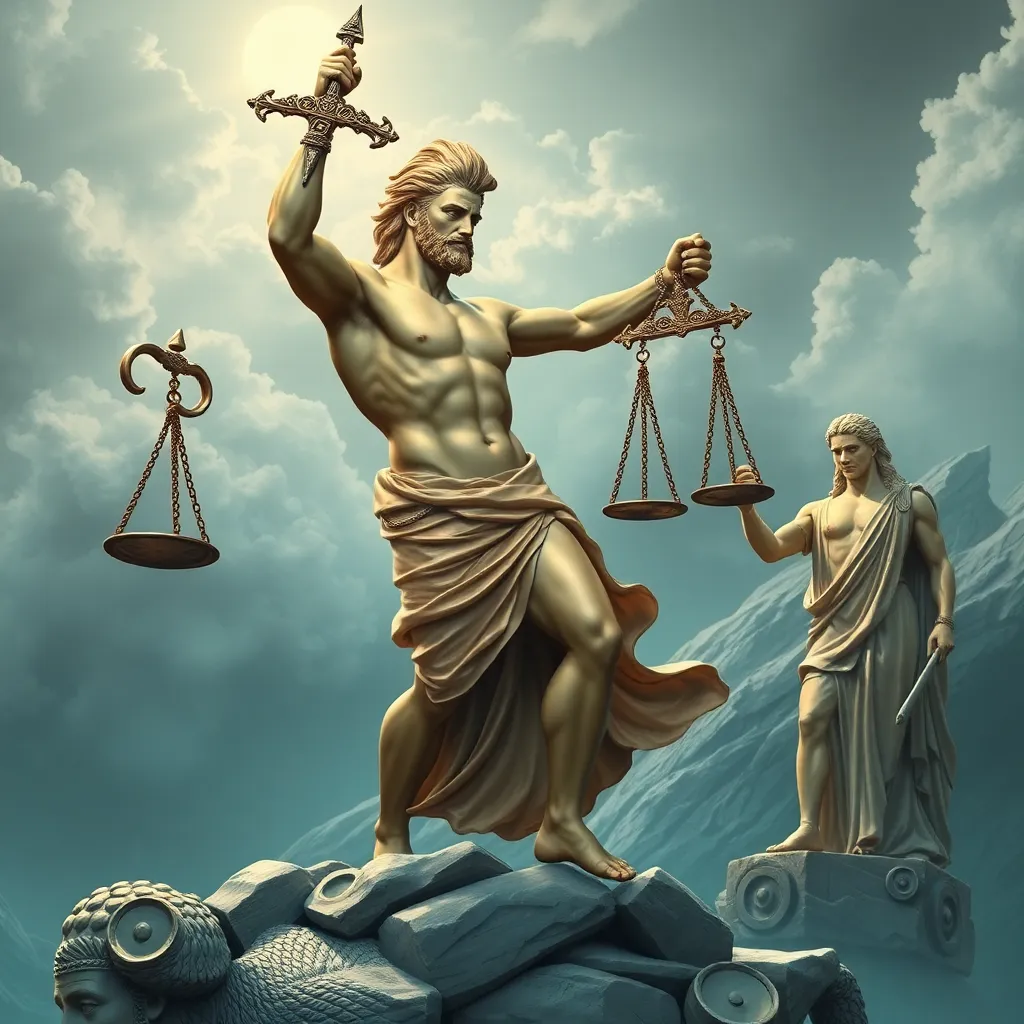Heracles and the Concept of Justice in Greek Mythology
I. Introduction
Heracles, also known as Hercules in Roman mythology, stands as one of the most celebrated heroes in Greek mythology. Known for his incredible strength and numerous adventures, Heracles represents the archetype of the heroic figure who embodies both physical prowess and moral integrity. Throughout his myths, the theme of justice emerges as a critical element, highlighting the hero’s journey and the moral dilemmas he faces.
This article aims to delve into Heracles’ relationship with the concept of justice, exploring how his actions and trials reflect the values of fairness, retribution, and redemption in Greek society.
II. The Mythical Origins of Heracles
Heracles was born to Alcmene, a mortal woman, and Zeus, the king of the gods. His divine parentage set the stage for a life marked by extraordinary feats and tremendous challenges. However, his birth was not without strife; Hera, Zeus’ wife, harbored deep resentment toward Heracles and sought to thwart him from the moment of his birth.
As a symbol of strength and virtue, Heracles embodies the qualities of a hero who overcomes adversity. His initial trials, including the madness inflicted upon him by Hera, which led to the tragic slaying of his own family, serve as a poignant reminder of justice’s complexities in the mythological world. These early experiences frame his narrative as one seeking redemption and rectification of past wrongs.
III. Heracles’ Twelve Labors: A Quest for Redemption
Perhaps the most famous aspect of Heracles’ mythos is the Twelve Labors, a series of tasks he was required to complete as penance for his actions. Each labor not only showcases his strength but also serves as a reflection of justice, both in terms of punishment and restoration.
- Overview of the Twelve Labors: The labors include slaying the Nemean Lion, capturing the Golden Hind of Artemis, and fetching the three-headed dog Cerberus from the Underworld.
The role of justice in these labors can be analyzed through two key lenses:
- Punishment of wrongdoers: Many of the creatures Heracles faced were manifestations of chaos and wrongdoing, serving as a means of restoring balance.
- Restitution for past sins: Each completed labor allowed Heracles to atone for his past misdeeds and move closer to redemption.
For instance, the slaying of the Nemean Lion not only demonstrates Heracles’ strength but symbolizes the triumph of good over evil. In contrast, the capture of the Erymanthian Boar reflects the theme of justice through the re-establishment of order in the natural world.
IV. The Role of Fate and Free Will
In Greek mythology, the tension between fate and free will is a recurring theme. Heracles’ life illustrates this dichotomy, as he grapples with predestined challenges while exercising his agency in response to them.
Despite being a demigod, Heracles’ choices significantly influence his journey. His decision to embark on the Twelve Labors, for example, demonstrates his commitment to justice and personal growth. Justice, in this context, reflects his ability to navigate the consequences of his actions and the moral implications they carry.
V. Heracles as an Avenger of Wrongdoing
Heracles often enacted justice not only through his labors but also in response to personal injustices he witnessed or experienced. His role as an avenger is critical in understanding his character and the moral landscape of Greek mythology.
Instances where Heracles enacts justice include:
- Defeating the bandit Antaeus, who challenged travelers and killed them.
- Rescuing Prometheus from his eternal punishment, showcasing his compassion and sense of justice.
The moral implications of these actions raise questions about the nature of justice. While Heracles acts out of personal vendetta or noble intent, the consequences of his actions often ripple through the mythological fabric, influencing the perceptions of justice among gods and mortals alike.
Moreover, comparing Heracles to other mythological figures, such as Athena or Nemesis, reveals differing approaches to justice—Athena’s wisdom versus Heracles’ brute strength—highlighting the multifaceted nature of this theme in Greek mythology.
VI. The Influence of Heracles on Greek Society
As a cultural hero, Heracles influenced Greek society’s understanding of justice and morality. His myths served as moral lessons, teaching values such as bravery, perseverance, and the importance of making amends.
Lessons of justice derived from Heracles’ stories include:
- The significance of accountability for one’s actions.
- The idea of redemption through hard work and perseverance.
- The concept that true strength lies in moral courage as well as physical prowess.
Heracles’ impact can also be seen in the legal and moral frameworks of ancient Greece, where his stories inspired discussions about retribution, fairness, and the responsibilities of individuals within society.
VII. Modern Interpretations of Heracles and Justice
In contemporary literature and media, Heracles remains a prominent figure, often depicted in films, novels, and graphic novels. These modern interpretations frequently explore the themes of justice and morality in ways that resonate with current societal issues.
Evolving views on justice, inspired by Heracles’ narratives, encourage discussions around themes such as:
- Redemption in the face of personal failings.
- The balance between vengeance and justice.
- Heroism in challenging moral dilemmas.
Heracles’ story remains relevant, serving as a lens through which we can examine our own concepts of justice and morality in today’s world.
VIII. Conclusion
Heracles’ contributions to the concept of justice are profound and multifaceted. His journey from a tragic figure to a heroic symbol of redemption encapsulates the complexities of morality in Greek mythology. Through his trials, he not only sought personal atonement but also upheld the values of justice that resonate through the ages.
The enduring legacy of Heracles continues to influence our understanding of heroism and moral responsibility, reminding us that the pursuit of justice is an integral part of the human experience.




